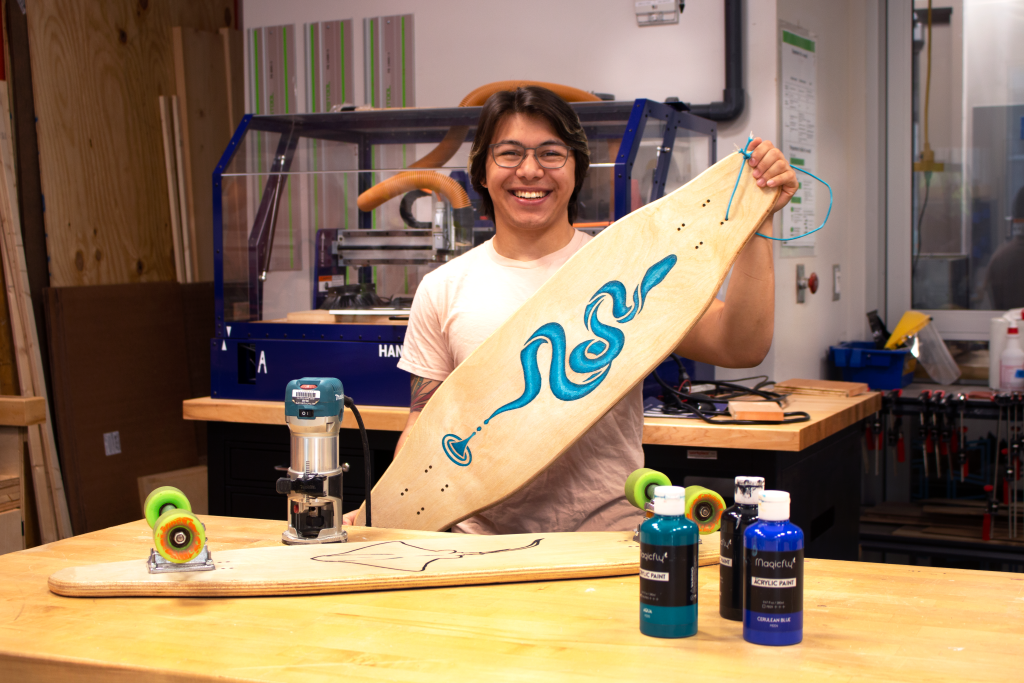Senior Levi Tox has been a maker since high school. This summer, he used his expertise to create an efficient — and fun — way to get to campus with the help of BeAM.

Levi Tox, a senior anthropology major, rides his skateboard to his job as a digital fabrication specialist at BeAM, a fact that is impressive even before finding out he made this skateboard — from scratch — at the very place he works.
“I hadn’t skateboarded until I made this,” Tox says with a laugh, gesturing at his finished skateboard that boasts neon wheels, glossy, sanded edges and a customized stingray design etched onto the board by way of the makerspace’s laser cutter.
But what he might have lacked in skateboarding experience, Tox more than made up for in design thinking, curiosity and problem-solving, three aspects that have led him and countless other Tar Heels to call BeAM home.
A history of making
Tox was first introduced to the maker mindset by his grandfather who was an engineer and had a workshop in his house where he would share his creations with Tox.
“I remember him making this propeller hat and a go-kart that had to have been bigger than this table,” recalled Tox, who sits at one of the large butcher block-style workstations in BeAM’s Murray Hall location. “That’s kind of where this love of making stems from.”
In high school, Tox began designing and creating on a 3D printer in his school’s drafting room. But it wasn’t until the fall of 2019 during his first year on campus when he passed the makerspace at Carmichael Residence Hall and noticed the alcove of 3D-printers that he realized it could become a key part of his Carolina experience.
“All you have to do is take the trainings,” he said, referring to the suite of hands-on training BeAM offers to get anyone started in the makerspace, regardless of prior experience.
He took them shortly after spotting the printers through the windows and quickly had a new home at UNC.
Renewed passion
The pivot to remote learning in 2020 took Tox away from the makerspaces, but when he returned to campus he did so with a renewed passion for the maker community.
“I knew I wanted to spend a lot more time in the space,” he said. He started by volunteering to help out in addition to making his own projects and was hired in the summer of 2021 to join the cohort of undergraduate students who work at BeAM part-time helping other makers to better learn the skills.
This summer, he put those skills to work creating a way to make it to campus quickly — and in style. Tox’s skateboards took him to nearly every corner of the makerspace, from the woodshop to carve out the board from a large plank of wood to the vinyl cutter to create the custom decals to the hand tools to attach the wheels.
“It turns out I chose a really good project because everything about skateboards is really standardized.” Online resources as well as fellow makers and BeAM mentors played a part in his process, too. As Tox elaborated on the time he put into the minute details — hand sanding the edges, painting the designs — a fellow maker stopped by to admire Tox’s work, remarking on the hours Tox spent sanding and perfecting the boards.
For Tox, every project presents a chance to learn new skills and perfect existing ones. “I plan on making a couple more boards,” he said. “These are just first iterations.”
That mindset perfectly encapsulates BeAM’s mission: to empower everyone to reach their full making potential. And for Tar Heels who are interested in using the makerspaces, Tox has some simple advice.
“Almost anything you can dream of making you can make here. You can be pretty ambitious, and you can get it done at BeAM.”
By Jess Abel, College of Arts and Sciences
